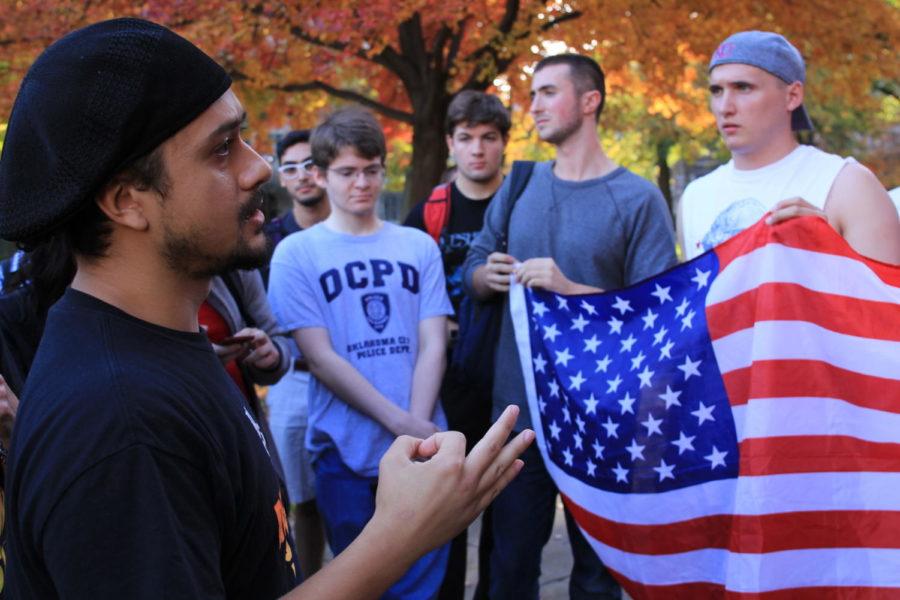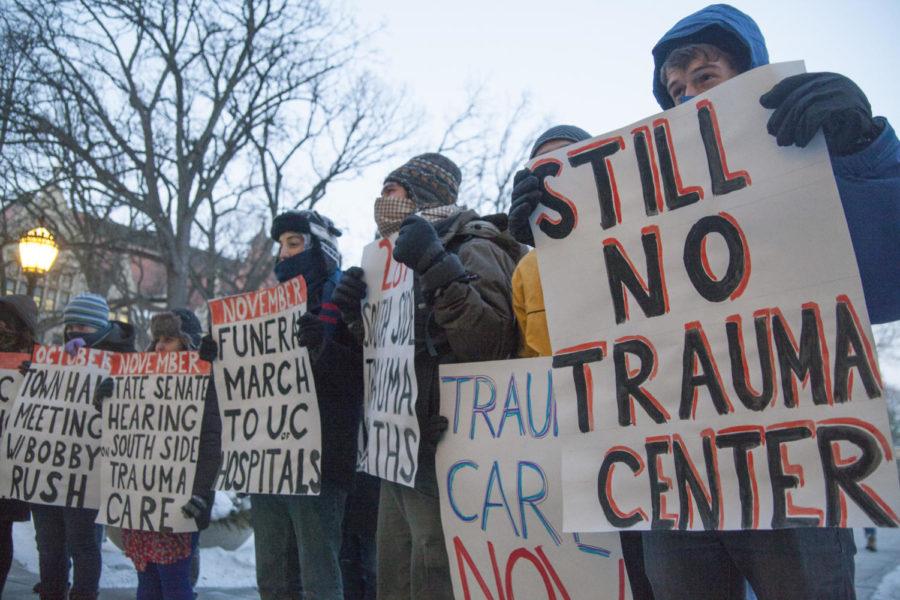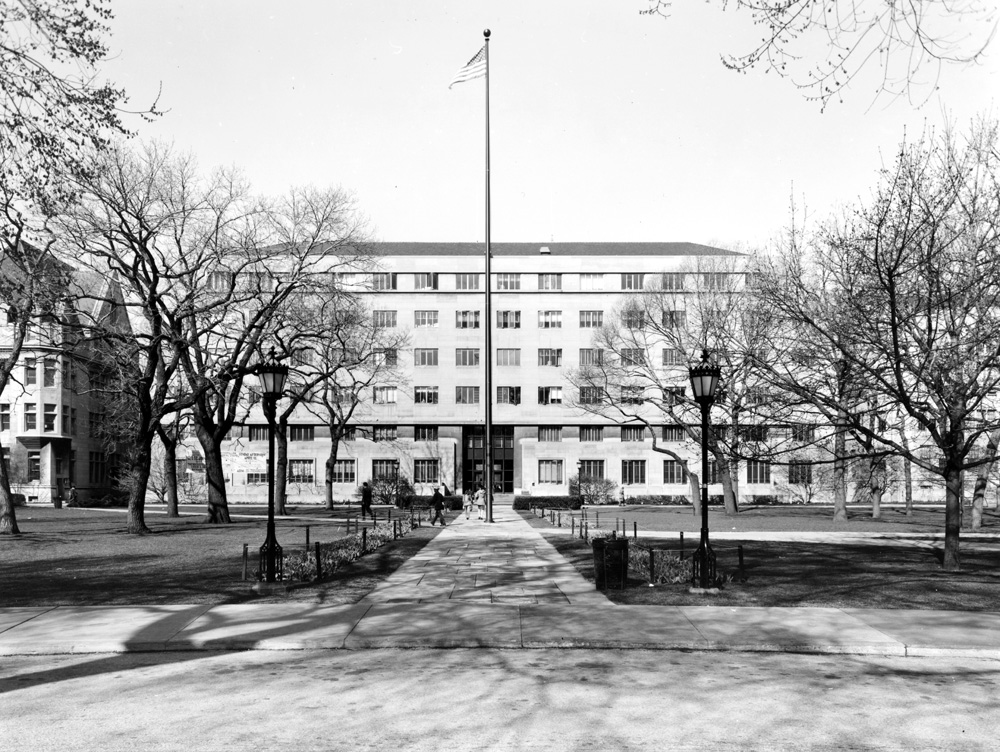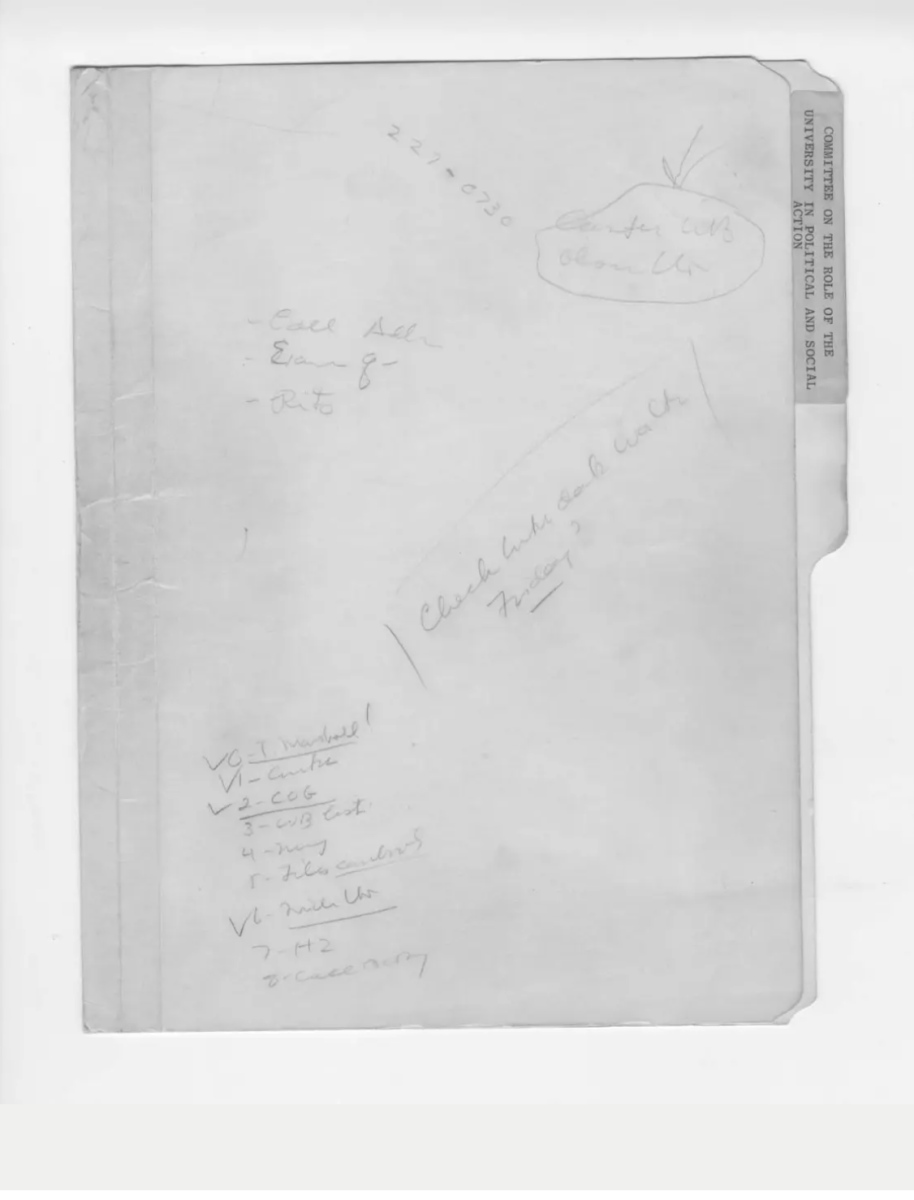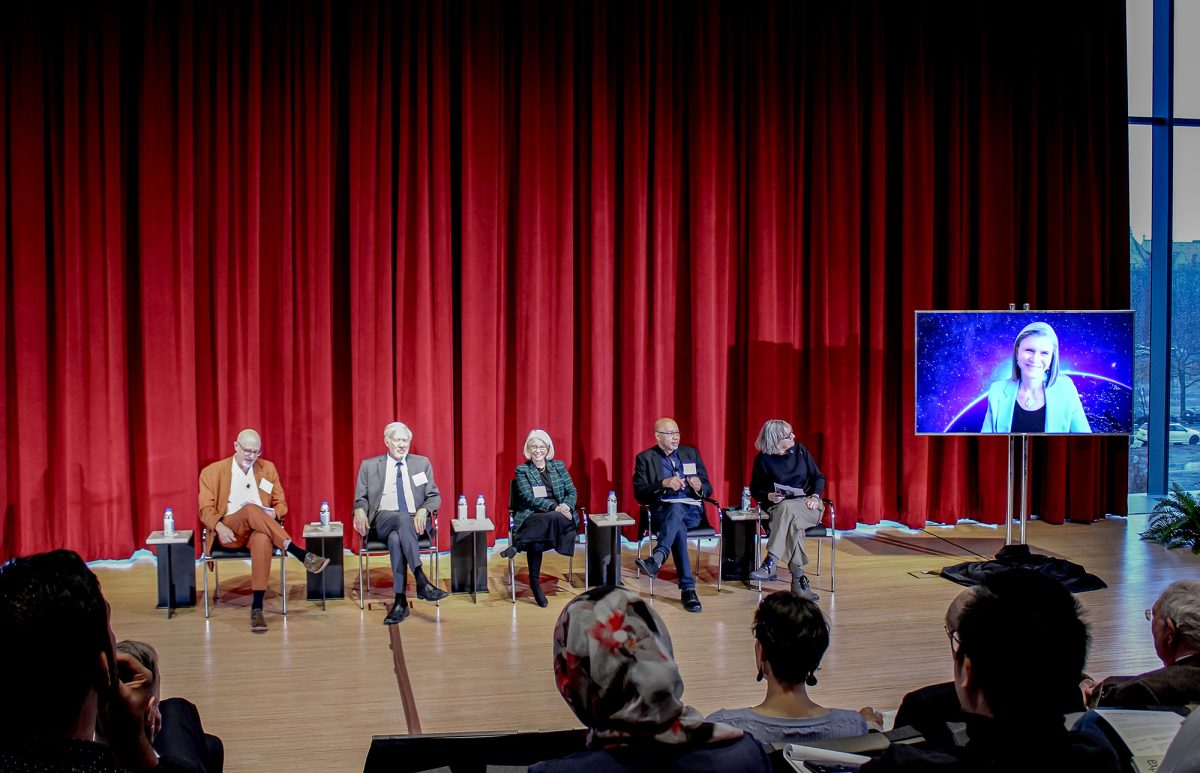Revolutionary Communist Party (RCP) members, or RevComs, as they are colloquially known around UChicago, are nothing if not devoted. Among campus protesters, they’re something of a staple. They stand outside the Reg, inside Reynolds, and sometimes on the quad. Knowing of them is common, knowing about them less so. Among their most well-known exploits is one of their members standing on a table in Baker back in 2016, upsetting a student’s bowl of cereal—and the student—in the process.
The Maroon’s editorial position back then was clear enough. In the annual “What We’re Thankful For” editorial, the Board expressed gratitude for “Revolutionary Communist Party member Noche Diaz, who heroically stood on a table in Baker Dining Commons and overthrew the entire system. Thanks, RevCom!”
Most people’s thumbnail sketch of the RevComs on campus seemed to be either one of two things, then: At best, a group known of but not known about; at worst, the butt of a joke.
But in a political climate where groups like the Democratic Socialists of America (DSA) are rapidly growing in membership, where do democratic socialists’ revolutionary “counterparts” fall? The RevComs are persistently on campus, despite lukewarm reception by students and hostile reception by the administration. So, what do they hope to do, and what gripes do they have with more widespread socialist organizations?
To a certain extent, the RCP’s alienation from mainstream socialism could stem from the fact that, in many ways, it’s rooted in an era different from a lot of modern leftist organizations. The RCP itself grew out of a number of Maoist and leftist groups of the ’60s–’70s counterculture, like Students for a Democratic Society. Bob Avakian—called “the Marx of our times” by Lucha Bright, a member of the Revolution Club Chicago whom I spoke to—slowly became the group’s sole leader as other leftist groups splintered from the party. Today, Avakian serves as the formal, theoretical, and cultural core of the organization. RevCom’s T-shirts, posters, and website all frequently extol his books on communist and revolutionary theory, and depict him in a similar style to Russian and Chinese communist propaganda posters of Lenin and Mao.
In one of the RCP’s higher-profile moments, a party member, Gregory Lee Johnson, initiated the landmark 1989 Supreme Court case Texas v. Johnson after burning an American flag during a political demonstration. The Supreme Court ruled that flag burning was part of protected speech. More recently, widespread claims of an impending “Antifa takeover” in November 2017 were inspired by the RCP-led Refuse Fascism protests.
I spoke with two RCP members recently: the aforementioned Noche Diaz and Lucha Bright. They showed up to Pret a Manger in distinct, Impact-font Revolution Club T-shirts and badges, sporting slogans about the revolution, Bob Avakian, and “sleepwalking through a nightmare.” We discussed what brought them to Chicago, their goals here and nationwide, and their thoughts on the mainstream American political climate.
Noche Diaz spoke quickly when talking to me—caffeine, he said. But his rapid speech also showed a kind of fluency in RevCom rhetoric and ideology rather than a caffeine buzz.
Bright was much more soft-spoken than Diaz, and, more often than not, Diaz led on the questions. But if there were disagreements between them on ideology or rhetoric, they didn’t show.
Neither Bright nor Diaz originally joined the RCP in Chicago. Instead, they’ve come and gone from the city as the RevComs have needed them, traveling to the RCP’s various chapters—Berkeley, Chicago, Los Angeles, New York—to advocate and evangelize for communist revolution. Chicago’s history of racial tension and class conflict made it an obvious choice for activism, Diaz said: He perceived a pitting of marginalized groups against each other, keeping them attacking each other instead of the current system.
“I came to Chicago because the whole world is talking about how Chicago is known for police getting away with the murder of Black and Brown people, and the very people who are the targets of that—especially the youth, Black and Brown youth—are caught up killing each other, instead of going up against the real enemy, which is this system and those who enforce it,” Diaz said.
If RevCom is in Chicago because of its history with police brutality, said Diaz and Bright, the party is on campus because of UChicago’s status as an elite learning center—one that, in their eyes, is being put to waste.
“That [intellectual education] can serve either getting rid of this system or keeping it going, and there is not on this campus an actual alternative to how this world is,” Diaz said.
Marx is taught at UChicago, he explained, but for the duplicitous goal of bettering and reforming capitalism, not overthrowing it. “There’s a lot of people talking about wanting to take back America from Trump and the fascists, there’s a lot of people who talk about trying to make America better, there’s even some people talking about trying to make America socialist. But we want a world without America and everything it stands for.”
Climate change, white supremacy, patriarchal society, suffering in less developed countries—none of it is being properly addressed by study at the University, according to Diaz. Diaz continued, “All that capacity people are developing, it’s not being put to work on confronting the problems that humanity is facing.”
“People are caught up in doing good work to help some people that are suffering, or maybe good work to contribute to some things,” but it’s all, in short, half measures, since none of it goes directly toward overthrowing the underlying causes, he said.
But the members of the RCP aren’t here to organize for campus issues. They’re here to organize for nationwide revolution. Anything less is misdirected effort. If there were a through line to Diaz and Bright’s responses, it’s that the RevComs are one of the only political or activist groups doing the truly meaningful work. Diaz will repeatedly emphasize the importance of overthrowing “the whole system”—capitalism and the U.S. government alike.
“We’re not coming here to try and figure out what’s wrong with this campus…including things that might be worth fighting around, but that’s not the key thing that people need to be involved in.”
If everything needs to go, anything less is coming up short. It’s the ideological chasm that separates groups like the RCP from, say, the aforementioned DSA. That divide means that trends like fewer young people favoring capitalism and more of them favoring socialism don’t necessarily herald good news for RCP devotees. Diaz describes some of them as “phony socialists and wannabe Marxists.”
The way Bright puts it, young people gravitating to democratic socialists like Bernie Sanders and Alexandria Ocasio-Cortez is “really fucking harmful.” To the RCP, politicians like Bernie Sanders and Alexandria Ocasio-Cortez are just playing a game of bait-and-switch, luring young people back into parties and institutions that they might otherwise distrust with promises of left-wing change. They’re delaying a vital revolution, if anything. Bright calls them and their policies “solutions that are non-solutions.”
I asked them what they thought of social or charitable work in particular, given historical instances where radical left groups mixed social work with their political work, such as the Black Panthers’ Free Breakfast for School Children initiative. Diaz and Bright said that this would be counterproductive to the RCP’s mission of complete societal revolution. Donald Trump’s presidency, Diaz reasoned, was the result of the fact that the underlying afflictions of American society aren’t being addressed. “Changes in the immediate term [like social work] have left this system in place, and now here we are, in 2019, talking about an open white-supremacist fascist at the head of the government of the United States, further unleashing Ku Klux Klan–type terror on people and resurrecting old and ugly about this country, that never really went away in the first place,” he told me.
The present situation, Diaz thinks, is a result of prioritizing short-term issues instead of overhauling society.
Even organizing for one’s own immediately-impactful issues seems to be a distraction in the view of the RCP. “Most of what you see is, people go to somewhere like [UChicago] or some community and get people involved in what’s affecting them immediately. But we need to go to everybody and actually talk to them about the whole world, and what’s going on there,” Diaz said.
The RCP’s suspicion of things like charitable work and short-term organizing act as symptoms to its own diagnosis that the main thing in the way of revolution is ignorance. There are a lot of people who “care about the right things” in the U.S., but they’re still too Americentric in their view. “Even people who want to do good are thinking about everything in terms of what’s in it for Americans,” Diaz said. The entire idea is that the system is so fundamentally broken that if just a sufficient number of people were made aware, the revolution would come from there. Thence the RCP could finally put into practice all of Bob Avakian’s theories on governance, and on carrying out a successful revolution—not like the failed or backpedaled revolutions of the ’60s and ’70s.
Diaz doesn’t give too many specifics as to how, exactly, the revolution would come about, but, if nothing else, he does express optimism. It’s a matter of “[removing] the blindfold and seeing the cracks in the wall. It’s not all powerful. These motherfuckers who run this system, they’re not all-powerful…and they’re sitting on top of a volcano that could erupt underneath them if we go to work,” he said.
But disagreements on means to an end aren’t the only things that have alienated the RCP from the modern left. At UCLA this past February, a Revolution Club Los Angeles member was escorted off the stage at an open mic poetry event after he began reading a graphic poem about violence against women around the world. The discomfort came from the fact that the reader, a white American man, was reading graphic poetry about experiences that were not his. As he was escorted off the stage, he began decrying intersectionality and identity politics. In FEM Magazine, a campus feminist publication, UCLA fourth-year and Dialogue editor for the magazine Gabriella Kamran wrote, “Only a white man’s worldview could select class and imperialism as the only relevant axes of oppression; only a white man could fail to understand that race, gender, and sexuality are the raw material for our capitalist and militaristic institutions.”
The RCP views his escort off the stage as censorship, and the focus on his identity as a white man as beside the point. Tala Deloria of the Revolution Club in Los Angeles wrote in response to those discomforted by the poem’s reading by a white man, “How convenient it is for this system when we can only speak from our own experience, never stepping out of our lanes to empathize with those on whose backs we are living, and instead censoring the telling of their stories in the name of preserving a safe space. A ‘safe space’ which, by the way, you are able to carve out BECAUSE of the imperialist position of the U.S. in the world.”
The RCP didn’t seem to change much as a result of that altercation. They stick around from an organizing perspective, even after legal threats and legal action, including felony charges for a member after a Reynolds Club protest in 2018. It seems, at least in this instance, to be a similar case ideologically. Their responses to the incident at UCLA did not backpedal, apologize, concede, or admit error. If anything, the Revolution Club in Los Angeles doubled down. They showed up to the UCLA campus the very next day and posted the censored poem on walls across campus. The posters called the hosts of the open mic “Identity Politics Hustlers.” They went to public spaces on campus and agitated, drew crowds, and argued.
At the end of the interview, before I turned off the recorder, Diaz leaned in to give a few closing words. He wanted to reiterate his point about college students. “Wake up, students! And I don’t mean that…fake woke shit. I mean actually, wake the fuck up.”



